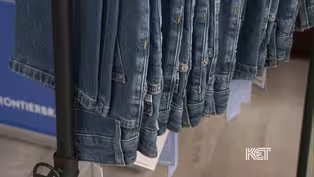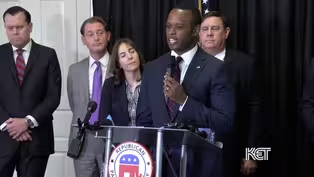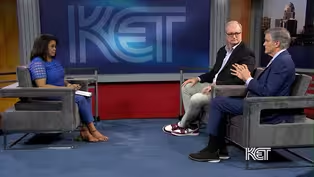
Solving Louisville's Problems
Clip: Season 1 Episode 250 | 5m 37sVideo has Closed Captions
New U of L president Kim Schatzel, PH.D talks about solving Louisville's problems.
New University of Louisville president Kim Schatzel, PH.D talks with Chip Polston about solving Louisville's problems.
Problems playing video? | Closed Captioning Feedback
Problems playing video? | Closed Captioning Feedback
Kentucky Edition is a local public television program presented by KET

Solving Louisville's Problems
Clip: Season 1 Episode 250 | 5m 37sVideo has Closed Captions
New University of Louisville president Kim Schatzel, PH.D talks with Chip Polston about solving Louisville's problems.
Problems playing video? | Closed Captioning Feedback
How to Watch Kentucky Edition
Kentucky Edition is available to stream on pbs.org and the free PBS App, available on iPhone, Apple TV, Android TV, Android smartphones, Amazon Fire TV, Amazon Fire Tablet, Roku, Samsung Smart TV, and Vizio.
Providing Support for PBS.org
Learn Moreabout PBS online sponsorshipAnd the final part of our interview series with the new University of Louisville president, Dr. Kim Schatz, all our Chip Paulson talks with her about how she sees you, about helping to address societal issues facing the Louisville community and how she's been accepted in her new role.
So you're leading the state's largest metropolitan university, a research university, rather, in Kentucky.
What do you see Dr. Seattle, as the university's role in addressing community issues, whether it be racial discord or gun violence?
What, if anything, can the university do to help mitigate and solve some of those problems that Louisville right here has is issues.
So I really see it as a three pronged approach.
One is, is the fact of the research that we can provide in terms of those areas, both policy research as well as to provide a better understanding, for example, of criminal justice in terms of recidivism, in terms of folks that are that are incarcerated, how we can be able to bring them back into society as as members.
You know, I talk about health equity, health disparities, to be able to do research in terms of population health.
We have tremendous faculty that do work in that area that can inform the decision making of the policymaking, both locally as well as nationally.
That's happening.
The second piece I see is our students.
I feel strongly in the fact that increasing the educational attainment for the Commonwealth of Kentucky and for the City of Louisville is a priority of mine.
Higher has gotten a bad rap lately nationally.
You know, people are questioning the value of a college degree, folks, a graduate of the college degree versus not their lifetime earnings is a million and a half dollars more than someone that doesn't have it.
They're unemployment rate is 2% compared to people with a high school degree of 8%.
They divorce less, they vote more, they're more engaged in their community.
They have, you know, 80% of the jobs that are going to be created over the next 20 years are going to require college degrees.
So by being able to produce talent for the state, as well as to be able to provide for many accessible pathways for people to complete their degrees addresses a lot of the root causes of the kinds of issues we're looking at with health care disparities, social injustice, as well as gun violence.
So it's a commitment and it's a it's an answer that higher education provides.
The third is convening is to be able to partner, you know, I think it's terrific to work with Metro Council.
The mayor and I have had several conversations about what we can do to partner together.
We have many partners that I'm meeting with around around Louisville, around the Commonwealth.
Universal Health is a tremendous partner to us and kind of the work that we do.
So to be able to partner with folks, to be able to address these concerns, other organizations and whether they be governmental business or nonprofits.
The more that we can bring to the table to work together, it can be one plus one equals ten, and we need ten X kind of responses to these critical needs.
So as a convener and as a facilitator, we bring a lot to the table.
In the months that you've been U of El President, you've embarked on a listening tour to kind of soak up what you can about the university.
What are you hearing?
What's the feedback that you're getting when you talk to people?
Well, the feedback has been, as I said, tremendously positive.
The love for the university, the respect for the university, the desire for the university to step into these spaces has been present and continues to be present.
You know, I've probably had about 30 listening sessions, probably talked to over 1200, maybe 1500 individuals both on and off campus students, faculty, staff, alumni, business and community leaders, nonprofits, both in Frankfort as well as in D.C. And all of them have spoken about the impact that the university makes and how they want to support the university doing more.
You know, the other piece that I learned about it is culture.
You know, I was specifically looking to the fact that better understanding the culture of the university as well as the culture of Louisville, as well as the commonwealth.
I don't think that you can lead effectively if you don't understand the context and the culture that you're in.
So people sharing their time with me, it was a gift to me to understand more.
And I know that I know more about you overall, and I know more about the city and know more about the Commonwealth than when I started.
So I feel we feel very at home and are really looking to be here for a very long time.
Final question in your introductory news conference, one of the greatest things I've seen in a news conference in a long time, a reporter tried to make an issue of your age and coming into the office.
How did you respond to that?
I told them that I had recently run a half marathon and 2 hours and 19 minutes and welcomed him joining me any single time.
Well, for some context, you were 30 years older than me and you would have beat me by 4 minutes the last time I ran one.
So congratulations, Dr..
So welcome to Kentucky.
Thanks so much.
It's just a pleasure to be here.
Thanks again.
Glad to have you.
Renee, back to you.
Thank you, Chip.
Dr. Schatz, his first day on the job was in February, and she's set to be sworn in officially as the US president on September the 29th.
Video has Closed Captions
Clip: S1 Ep250 | 3m 10s | Kentucky clothing company New Frontier makes clothing with a purpose. (3m 10s)
Kentucky Governor's Race Underway
Video has Closed Captions
Clip: S1 Ep250 | 3m 35s | Just days after the primary, the race for Kentucky Governor is already heating up. (3m 35s)
Kentucky Primary Election Recap
Video has Closed Captions
Clip: S1 Ep250 | 6m 54s | Trey Grayson and Bob Babbage join Renee Shaw to discuss takeaways from the 2023 primaries. (6m 54s)
Providing Support for PBS.org
Learn Moreabout PBS online sponsorship
- News and Public Affairs

Top journalists deliver compelling original analysis of the hour's headlines.

- News and Public Affairs

FRONTLINE is investigative journalism that questions, explains and changes our world.












Support for PBS provided by:
Kentucky Edition is a local public television program presented by KET


